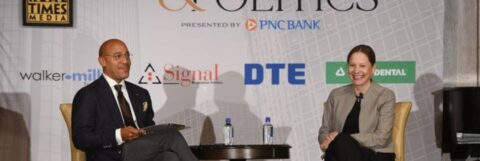Michigan Chronicle
May 22, 2023
During a recent discussion at the Pancakes & Politics event, General Motors (GM) CEO Mary Barra delivered a significant message, highlighting the need for a measured approach to electric vehicles (EVs), continued efforts towards diversity and inclusion in businesses, and a focus on education for children.
Barra acknowledged that transitioning to EVs would be a gradual process, stating, “Ramping up to EVs will take decades.” She drew historical context, pointing out that it took societies approximately 50 years to fully switch from horse-and-buggy to internal-combustion vehicles. However, she expressed optimism that the shift from gasoline-run vehicles to EVs would happen more swiftly. Barra predicted, “The switch from gasoline to EVs will not take as long.”
Addressing EV entrepreneurs, Barra advised them to seize the transformative opportunities presented by this period of change. She said, “This is a time of great transformation—and opportunity.” She also brought attention to the current challenges surrounding EV technology. In a light-hearted moment, Barra mentioned the incompatibility of car chargers and the high cost of an EV charger adapter at Walmart, stating, “An EV charger adapter costs $150 at Walmart.”
 Barra further revealed that GM and other automakers were encountering supply-chain issues, hampering the introduction of new EVs. Businesses along the chain faced difficulties in hiring employees, resulting in order delays. Despite these obstacles, GM was committed to fulfilling current orders for both EVs and gas-fueled cars, as Barra emphasized the strong demand for both vehicle types.
Barra further revealed that GM and other automakers were encountering supply-chain issues, hampering the introduction of new EVs. Businesses along the chain faced difficulties in hiring employees, resulting in order delays. Despite these obstacles, GM was committed to fulfilling current orders for both EVs and gas-fueled cars, as Barra emphasized the strong demand for both vehicle types.
The CEO acknowledged that the interface and app connectivity of EVs needed adjustment. Some customers questioned GM’s decision to remove Apple CarPlay and Android Auto from upcoming car models, beginning with the 2024 Chevy Blazer EV. Barra assured the audience that GM aimed to provide a more seamless experience by integrating maps, phones, and apps. She stated, “We are going for better integration of maps, phones, and apps for a more seamless experience.”
Barra expressed GM’s dedication to the Detroit community by announcing a $250 million investment in the city, with $50 million already allocated to education. She stressed the importance of investing in education to retain talented individuals within the city. Barra stated, “In order to keep people here, we must invest in education.”
Furthermore, Barra emphasized the need for companies to prioritize diversity, equity, and inclusion, echoing the sentiments of previous Pancakes & Politics guests who highlighted the profitability of diverse organizations. The CEO commended GM’s commitment to standing in solidarity with racial justice, particularly during the protests following George Floyd’s death. Referring to a message posted on the company’s intranet in 2020, Barra said, “The recent deaths of George Floyd, Ahmaud Arbery and Breonna Taylor astonishingly add to the important and unconscionable list of black Americans who have lost their lives based on the color of their skin. Let’s stop asking ‘why’ and start asking ‘what.’”
During the event, Barra expressed gratitude for the acknowledgment and support received from attendees. She shared insights gained from listening sessions with media mogul Byron Allen and Black media outlets, emphasizing the importance of cultivating an inclusive workplace and valuing people’s experiences. Barra stressed the need to address representation, promotion, and bias within organizations. She stated, “We have to look at representation and promotion—and bias.”
In the Q&A session, Dr. Geneva Williams, CEO of Dr. Geneva Speaks, LLC, praised Barra as a role model and posed an intriguing question regarding the new female head of Twitter, Linda Yaccarino. Williams inquired about the concept of the “glass cliff,” where individuals from marginalized groups, such as women or people of color, are more likely to assume leadership roles during periods of crisis or downturn when the risk of failure is high.
Barra responded by stating that Yaccarino took the role with confidence and emphasized that the idea of the glass cliff oversimplified her situation. Barra highlighted the need to explore the narrative behind the glass cliff concept, suggesting it was an intriguing story worth examining. She replied, “She took the role believing she can do it—and yes, an individual needs support. But the glass cliff idea sells her short. What the glass cliff is, is an interesting story.”
Barra’s discussion at Pancakes & Politics sheds light on the importance of approaching the transition to EVs patiently, while emphasizing the significance of diversity, equity, inclusion, and education in driving progress. Her insights and quotes resonated with the audience, underscoring the need for long-term commitment, adaptability, and a focus on creating an inclusive and sustainable future for the automotive industry and beyond.
Andrea Plaid contributed to this article.

